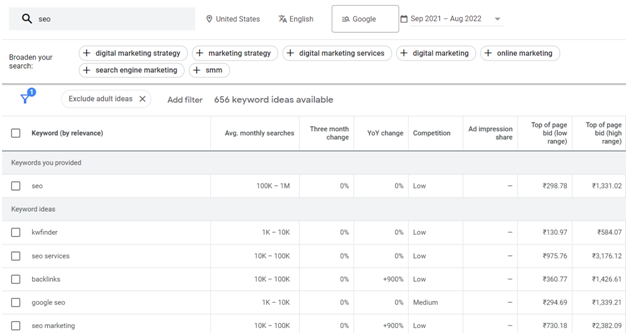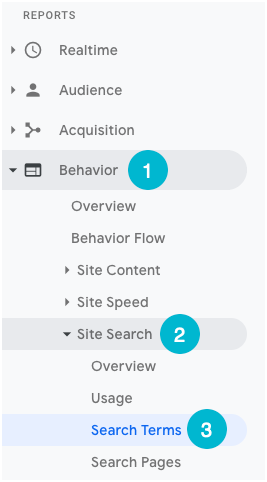8 Free Ways to Research and Analyze Keywords for Blog Posts

Keyword research and analysis don’t have to be costly.
Several keyword research tools for marketing like Moz, Ahrefs, and SEMrush can be accessed for a monthly fee.
You should not use expensive keyword tools if you want to find relevant keywords. Free tools include Keyword Planner.
To increase the variety and make the article easier to read, we added excerpts from 50 marketers’ insights.
If you want keyword optimization, try these eight resources and techniques.
How to Do Keyword Research for Free: 8 Options
The starting point of search engine optimization involves keywords. The goal is to name your post about a topic that many people are searching for so that it ranks highly in organic search.
The best free ways to find your blog’s keywords
1. Conduct Competitor Keyword Research
You can do some keyword research for blog posts by knowing which keywords the site’s competitors are ranking for.
One way to find ranking keywords for your competitors is to create a free Moz community account. This account gives you 10 free searches per month in Moz Keyword Explorer and easy access to this data through the interface is an invaluable asset for bloggers.
To find competitor keywords, just run Moz, type in your competitor’s URL, and click search to get a list of their top keywords.
If you need to conduct more in-depth research than Moz’s free options allow for, Ubersuggest can help. It is a completely free keyword research tool that can be used without spending any money.
This method may be used to find the same keywords as your competitors, but another approach is to find new keywords that they can’t target.
2. Start with a Broad Search to Get More Specific Keyword Ideas
An efficient way to find relevant keywords is to use a keyword research tool to find broad topics, then find key phrases and ideas related to that topic.
There are many tools that you can use for this approach, including Moz Keyword Explorer which offers 10 free searches per month, and Ubersuggest with unlimited free searches. Google Keyword Planner offers unlimited free searches.
Start by creating a broad keyword that’s related to your business or topic. You might use search terms like ‘inbound marketing’ or ‘marketing automation.
Try using the keyword tool to find related keywords.

Dig through those related keywords to look for those you could turn into blog posts. For example, “seo services” might be a great keyword.
Google Keyword Planner is designed for keyword research for clicking on ads, not specifically organic keywords. Although the tool can be used to identify popular keywords and phrases, it should not be relied upon for SEO purposes.
Our respondents were divided on how effective Google Keyword Planner was as a keyword research tool.
Here you can check – How to find keywords by using the suggestions shown on Google search after entering a keyword.

Also, check the “People Also Ask” section

3. Start with an Idea, Then Find Keywords to Target
If you already have a blog post idea and are looking for keywords, there are a number of free keyword tools you can use. One is the Google Adwords Keyword Tool which predicts the popularity of any given keyword.
4. Uncover the Questions People Are Asking
While Google is really good at giving you the information that you’re looking for most of the time, it cannot answer everything. When people don’t find what they’re looking for using Google Search, they often turn to online communities to get advice from their peers.
5. Use Amazon to Find Ecommerce Keywords
Amazon provides a search bar that produces relevant searches based on your inquiry. This can be helpful for doing keyword research when finding a product to sell.

To gain information on how a phrase is used, you can enter your primary phrase and see the top searches related to it.
6. Use Google Trends to Find Trending Topics
Use Google Trends for keyword research.
This site can be informed about current trends.

Google Trends also shows the timing of keywords and how they can be used before.

With this sort of custom search, you can quickly look through Google Trends to see recent and relevant trending topics.
To find the latest searches related to a topic, type your keyword and select a topic from the drop-down.

This will show you popular, on-topic keywords with high search volumes.
7. Uncover Keywords You’re Already Ranking For
Google Search Console can be a valuable source of keywords that you might not even realize are related to your content.
In order to find keywords that your site already ranks for, use Google Search Console, and click on “Performance.” Scroll down and you will see a list of all the keywords that your website is ranking for, as well as the number of searches these keywords have.
The list of keywords you were saving can be downloaded as a CSV to find new keywords and new topic ideas.
You can also find old blog posts that need to be updated by scrolling back up, searching for the average position of keywords on page one, and then looking for keywords where you rank on page one but don’t have the top rank.
8. Use Site Search Data to Uncover What People Are Struggling to Find
You can use Google Analytics data to find out which searches people are doing on your site. These could be topics you’ve never covered before or popular topics that never get enough attention.
Google Analytics can tell you the most common searches people are using.

You can look for gaps in your content, by checking what people are searching for. If you see a search that has been typed into your site’s search bar, then you should write a blog post about it.
A Few Final Keyword Research Tips
It’s tempting to start picking keywords with no strategy in mind. But you need to plan first.
Depending on the company, there are a variety of factors to take into consideration. However, it is up to the company to decide on its strategy for choosing and targeting different factors.
This extensive list of keywords can help you find the keywords that are relevant to your company.
Sambhav Shah is a founder of Digital Aura and takes great pride in creating link-building strategies from mid-market business size to the enterprise. Digital Marketing and SEO is his passion. While not at work he loves to play cricket and spends his time on research and reading digital marketing content.
